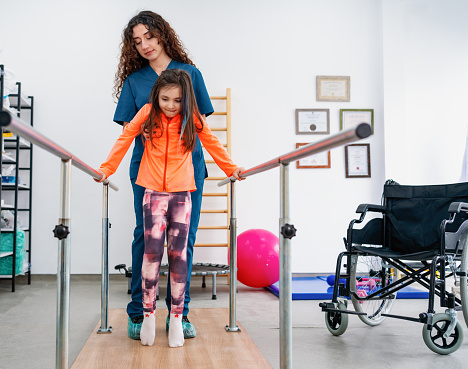Physiotherapists are trained to deal with children’s neurological and developmental problems. They work closely with the child’s parents and other caregivers, addressing their unique needs and providing fun activities. Here are a few examples of the types of treatments and exercises that these professionals provide.
Physiotherapists treat children with neurological and developmental problems
Physiotherapists treat children with developmental and neurological problems to help them maximise their potential. Physiotherapy focuses on promoting the development of children’s physical abilities and is often provided in the home, nursery or school setting. Treatments are customised to meet the needs of the child.
Children with neurological and developmental problems are often referred to physiotherapists by their pediatricians. These conditions include congenital problems, such as cerebral palsy, developmental disabilities, and disorders that affect the spinal cord. Other conditions needing physiotherapy include neurological diseases and brain and spinal cord cancers. Symptoms can vary widely from person to person, and treatment is dependent on the type of problem and its severity.
Physiotherapists from physioinq.com.au/mobile/wa/perth/paediatric-physiotherapy also treat children with postural problems and torticollis. They often work closely with other health care providers. They may also be specialists in cognition and emotional problems. Depending on the problem, physiotherapists may need to perform several different tasks.
Developmental disorders affect the development of a child’s bones, joints, and muscles. Physiotherapy can improve these conditions and help the child function more normally throughout the day. Pediatric physiotherapy can help children improve their muscles, improve their posture, and improve their balance.
Physiotherapy is an important component of the treatment process for children. Whether a child is recovering from an illness, injury, or traumatic event, physiotherapists can help them improve their physical capabilities. During treatment, physiotherapists use a variety of exercises and massage techniques to help children recover from their injuries. During this process, they also engage children in age-appropriate games and activities.
Physiotherapists also help children with a range of physical disabilities. A common example is cerebral palsy, which affects movement, posture, and balance. Cerebral palsy is a condition that occurs when the brain is damaged during its developmental stage. Physiotherapists assist patients with cerebral palsy and other neurological problems by developing muscle strength and functionality.
They work closely with parents, guardians, and caregivers
Children’s physiotherapists help children develop movement skills and strengthen muscles. They may focus on upper-extremity strength and flexibility, balance, and endurance. Some physiotherapists specialise in specific areas, such as children with motor disorders, weight-related concerns, or high-performance athletes. Children with these conditions may receive therapy at a physiotherapy clinic or gym, which includes equipment like a ball pit.
Parents and guardians have a right to know their child’s health information. Physiotherapists for children will discuss their findings with parents or caregivers if they think it is in their best interest. They will also encourage their children to discuss their concerns with their caregivers. If the child is too young to consent, the health professionals will contact the parents to ask permission to share information.
They provide opportunities to play and have fun
Physiotherapists provide opportunities for children to engage in fun activities to improve their bodies. Physiotherapists view play as an important means of assessment, relationship-building, and maximisation of motivation in children. Physiotherapists and occupational therapists also view play as a crucial way to establish contact between the child and the clinician.
The use of equipment allows children to play and move around freely. It helps them feel confident, and the therapist can see the child in action. The use of various equipment also allows the therapist to observe the child’s progress. Although many physical therapists treat children as young as infants and toddlers, some older children require physiotherapy services.
They manage children’s conditions
Physiotherapists use their expertise in anatomy and physiology to develop treatment programmes tailored to the needs of each child. These programmes are individualised to the child, incorporating age-appropriate activities and developmental play to help the child regain strength, balance, and coordination. They also work closely with parents, doctors, and caregivers to help children achieve their full potential.
As a child development specialist, a physiotherapist helps children function at their best. They work closely with parents and other caregivers to treat children’s conditions and help them reach their full potential. In schools, they may work as part of a multidisciplinary team to develop a Statement of Special Educational Needs. They may also advise teachers and classroom assistants on activities and games.
Physiotherapists help children function at their maximum potential
Physiotherapists are trained to help children develop the physical skills necessary to function at their full potential. Their treatments may focus on developing gross motor skills, strength, and flexibility. Pediatric physiotherapists work with children and their families to help them function at their highest level. Their patients range from newborns in the Neonatal Intensive Care Unit to competitive athletes in their teens.
Physiotherapists specialise in orthopedics, pediatrics, and sports medicine. They work with children with various conditions, including developmental pediatrics, torticollis, and sports injuries. They aim to help children reach their full potential and live active lifestyles.
Physiotherapists are trained to treat injuries and promote healthy movement patterns. They have a broad range of skills and can help any child recover from a physical injury. They can help children with developmental issues such as a lowered IQ or a physical disability.

Comments